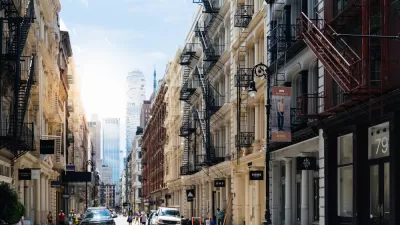Places Journal has launched a series titled "The Inequality Chronicles." Expect high-quality longform articles.
"The Inequality Chronicles" series by Places Journal began this month with a story titled "Memphis Burning," which sets the stage with a fire on February 26, 1953, when a fire burned down the home at 384 South Lauderdale Street. That kind of historic scope is reflected through the piece—which tells a history of racism as it has manifested in the housing market of Memphis since before even the beginning of World War II. The key theme that emerges from the history told by Preston Lauterbach: "Inequality is enforced in Memphis, and it always has been."
Michael Berryhill pens the second installation of the series, lending the same variety of ambitious scope and journalistic rigor to the story of East Aldine, a 15-square mile area of unincorporated land in the middle of metropolitan Houston. Berryhill details a partnership between East Aldine and Neighborhood Centers Inc., " a nonprofit group that has quietly backed Houston’s poor for more than a hundred years."
After introducing Angela Blanchard, the director of neighborhood Centers, Berryhill describes the fundamental dynamics of the partnership:
It’s tempting to say that East Aldine is Angela Blanchard’s next project, but that would be misleading. She is East Aldine’s next project. Neighborhood Centers preaches a gospel called appreciative inquiry. Instead of barging into a community and telling residents what to fix, Blanchard’s organizers listen. They identify local leaders and ask what they can do to help. While many nonprofits talk about bottom-up organizing, this one takes it to another level. “We are so fanatical about treating people with respect,” Blanchard said. “It is embedded in the culture. We train on it. We teach other people.”
If the Neighborhood Centers name and method sounds familiar, you might have read the chapter about the organization in The Metropolitan Revolution, by Brookings Institution analysts Bruce Katz and Jennifer Bradley.
Both of the articles in the series so far are highly recommended for planners and anyone else interested in tackling the complex and varied problems of inequality.
FULL STORY: Memphis Burning

Planetizen Federal Action Tracker
A weekly monitor of how Trump’s orders and actions are impacting planners and planning in America.

Canada vs. Kamala: Whose Liberal Housing Platform Comes Out on Top?
As Canada votes for a new Prime Minister, what can America learn from the leading liberal candidate of its neighbor to the north?

The Five Most-Changed American Cities
A ranking of population change, home values, and jobs highlights the nation’s most dynamic and most stagnant regions.

San Diego Adopts First Mobility Master Plan
The plan provides a comprehensive framework for making San Diego’s transportation network more multimodal, accessible, and sustainable.

Housing, Supportive Service Providers Brace for Federal Cuts
Organizations that provide housing assistance are tightening their purse strings and making plans for maintaining operations if federal funding dries up.

Op-Ed: Why an Effective Passenger Rail Network Needs Government Involvement
An outdated rail network that privileges freight won’t be fixed by privatizing Amtrak.
Urban Design for Planners 1: Software Tools
This six-course series explores essential urban design concepts using open source software and equips planners with the tools they need to participate fully in the urban design process.
Planning for Universal Design
Learn the tools for implementing Universal Design in planning regulations.
New York City School Construction Authority
Village of Glen Ellyn
Central Transportation Planning Staff/Boston Region MPO
Institute for Housing and Urban Development Studies (IHS)
City of Grandview
Harvard GSD Executive Education
Regional Transportation Commission of Southern Nevada
Toledo-Lucas County Plan Commissions




























